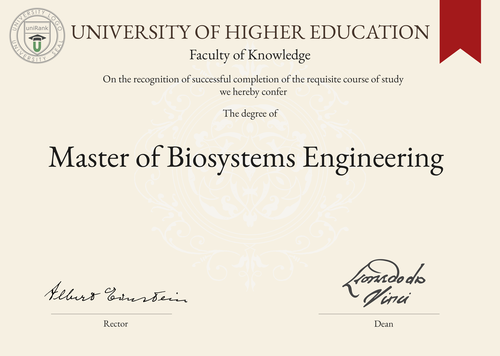
Master of Biosystems Engineering (MBE)
Guide to Master of Biosystems Engineering Program/Course/Degree
Master of Biosystems Engineering (MBE)

Program Name:
Master of Biosystems EngineeringProgram or Degree abbreviation:
MBEDuration range:
1.5 to 2 yearsTuition range:
Varies by country and universityOverview:
The Master of Biosystems Engineering program is designed to provide students with advanced knowledge and skills in the field of biosystems engineering. This interdisciplinary program combines principles of engineering, biology and technology to address challenges related to the design, development and management of biological systems and processes.Curriculum Overview by year:
- Year 1: - Introduction to Biosystems Engineering - Advanced Mathematics for Engineers - Biological Systems Modeling - Sustainable Agriculture and Food Engineering - Bioprocess Engineering - Year 2: - Advanced Biotechnology - Precision Agriculture and Remote Sensing - Environmental Systems Engineering - Engineering Design and Innovation - Research ProjectKey Components:
- Integration of engineering principles with biological systems - Application of technology in agriculture, food production and environmental management - Development of sustainable solutions for biosystems challenges - Hands-on experience through research projects and practical trainingCareer Prospects:
Graduates of the Master of Biosystems Engineering program can pursue various career paths in industries such as agriculture, food processing, biotechnology, environmental management and consulting. They can work as biosystems engineers, agricultural engineers, bioprocess engineers, environmental engineers, or research scientists.Salary Expectations:
The salary expectations for Master of Biosystems Engineering graduates can vary depending on factors such as the country, industry, job position and level of experience. On average, biosystems engineers can earn a competitive salary ranging from $60,000 to $100,000 per year. For a more accurate understanding of salary expectations, you can utilize the Job Sites Search Engine, from our sister site jobRank, which searches over 4,600 job sites worldwide. Make sure to specify not only the job title but also the country you are interested in.Conclusions:
It is important to note that the duration, tuition fees, curriculum, key components, career prospects and salary expectations of the Master of Biosystems Engineering program can vary based on the chosen country or location for studying the program, as well as the chosen university. Prospective students are advised to research and compare different universities and countries to find the best fit for their academic and career goals. Visitors can search for where this specific degree, Master of Biosystems Engineering, is offered anywhere in the world through the uniRank World Universities Search Engine.World Universities Search Engine
search for Master of Biosystems Engineering (MBE) and add the Location (country, state etc.) or specific University you are interested in studying at.
Query examples:
- Master of Biosystems Engineering (MBE) United States
- Master of Biosystems Engineering (MBE) United Kingdom online
- Master of Biosystems Engineering (MBE) Australia international students
- Master of Biosystems Engineering (MBE) University of California
- Master of Biosystems Engineering (MBE) University of London tuition fees
- Master of Biosystems Engineering (MBE) University of Sydney scholarships
Share Program/Course
Interesting? Share this program/course/degree info with your friends now.